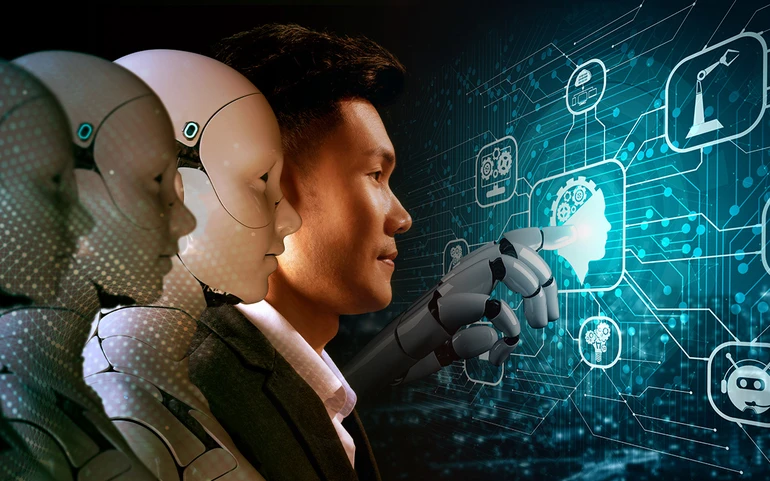
Artificial intelligence (AI) is far from a new technology, but only in recent years has its real impact been felt in industries across the enterprise landscape. From quantum computing to generative AI chatbots, the adoption of AI technologies has increased in almost every sector, with companies big and small finally considering the technology as a viable business tool.
Worldwide spending in the AI market has increased an average of 19 per cent year over year, rising to $432.8 billion in 2020 and predicted to breach the $500 billion mark by 2023, according to IDC. By the end of 2023, experts believe AI will have progressed far enough to become the most revolutionary technology ever created by mankind.
It is worth looking forward to this shift to understand the role Ai will play in the digitalised revolution of the enterprise. Here’s everything AI we can expect to see in the new year.
AI-wired decision intelligence will prevail
2022 was a year filled with multiple challenges for the enterprise. The stock market plummeted, interest rates surged and many thousands of tech professionals lost their jobs. As industries find themselves faced with even stronger economic headwinds in 2023, decision-makers will struggle to make tough decisions as they are forced to adapt to the new macroeconomic environment.
In comes automated decision making – where businesses use AI to make faster, more accurate, and more consistent decisions on datasets. This technology will allow enterprises across a wide range of sectors to combine advanced data science and multiple disciplines to monitor, model, optimise and maintain decision models and processes when faced with the new year’s difficult decisions.
Gartner named AI decision intelligence as one of its top technology trends for 2022, predicting that more than one-third of large organisations will use AI-enabled decision intelligence in their day-to-day business operations by 2023.
AI gimmicks out, practical applications in
Generative AI has been a bit of a buzzword this year, with text and image generation applications like OpenAI’s DALE-E 2 and GPT-3.5 grabbing headlines around the world.
The reality, however, is that generative AI is not a new technology – nor is it limited to trivial applications that are more recreational than practical within the enterprise space. Over the past 10 years, advanced AI models have digested hundreds of billions of words, texts and languages. With all this data, AI is evolving at such a rate that experts believe that it will soon find its place in the workplace.
Sequoia predicts that by 2023, generative AI will be capable of putting together scientific papers and visual design mock-ups; and by 2030, able to write, design and code better than any human professionals.
Generative AI will allow companies to hasten writing processes, greatly improve customer service through analytical conversation transcripts, and create design visual mockups in seconds.
AI to emerge as companion to Internet of Things (IoT)
With the launch of IoT devices in the enterprise allowing companies to capture a tremendous amount of data from multiple sources, experts believe that in 2023 AI will be key to leveraging the full potential this data has to offer.
IoT artificial intelligence brings a number of benefits for companies and consumers alike, allowing companies to create enhanced products and services by enabling businesses to rapidly process and analyse data. Pairing AI with IoT also helps businesses understand and predict a wide range of risks and automate a prompt response.
This will allow companies to better handle financial loss, employee safety, and cyber threats, all of which are set to present great challenges for the enterprise in 2023.
Improved collaboration between business and IT teams
Artificial intelligence is already reshaping business models and improving communication between teams of people across multiple sectors of the enterprise.
However, one of the areas where collaboration has been lacking is between businesses and IT teams. In 2023, experts predict that AI will be holistically embraced across multiple departments, allowing for more collaboration between previously unsynchronised teams.
“In 2023, as companies brace for greater economic volatility, there will be more pressure to not only do more with less but also demonstrate AI’s business value from the onset,” Farshid Sabet Chief Business Officer told The Enterprise Project.
“Despite IT leaders recognising the benefits that AI delivers in improved automation, insights, and efficiency, AI still requires stronger collaboration between the business and IT to ensure that the technology is truly addressing business issues and needs,” he added.
AI will be ethically regulated
As AI’s implementation around the world increases, new laws and regulations around its use in decision-making are set to come as soon as January 1, 2023.
These regulations are likely going to be global, but the first comes in the United states with NYC Local Law 14. This obligates employers to only use AI-decision making tools for employment or promotion decisions if that AI has been subject to an independent bias audit within the past 12 months.
The introduction of AI regulations will encourage the idea of creating data and algorithms that are not only fast and efficient but also free of bias. This ethical responsibility is set to become one of AI developers’ biggest challenges as its popularity grows within the enterprise.
As Siobhan Savage, cofounder of Reejig writes “2023 will not only be the beginning of ethical AI accountability, as lawmakers, organisations, and society look at how vendors are managing the risk of bias when it comes to applying decision-making support to people.”

